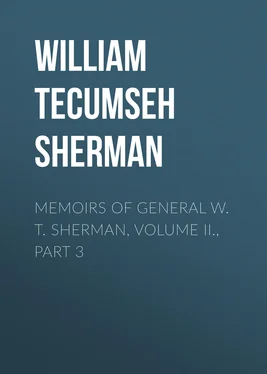William Tecumseh Sherman - Memoirs of General W. T. Sherman, Volume II., Part 3
Здесь есть возможность читать онлайн «William Tecumseh Sherman - Memoirs of General W. T. Sherman, Volume II., Part 3» — ознакомительный отрывок электронной книги совершенно бесплатно, а после прочтения отрывка купить полную версию. В некоторых случаях можно слушать аудио, скачать через торрент в формате fb2 и присутствует краткое содержание. Жанр: Биографии и Мемуары, История, foreign_edu, foreign_antique, foreign_prose, на английском языке. Описание произведения, (предисловие) а так же отзывы посетителей доступны на портале библиотеки ЛибКат.
- Название:Memoirs of General W. T. Sherman, Volume II., Part 3
- Автор:
- Жанр:
- Год:неизвестен
- ISBN:нет данных
- Рейтинг книги:3 / 5. Голосов: 1
-
Избранное:Добавить в избранное
- Отзывы:
-
Ваша оценка:
- 60
- 1
- 2
- 3
- 4
- 5
Memoirs of General W. T. Sherman, Volume II., Part 3: краткое содержание, описание и аннотация
Предлагаем к чтению аннотацию, описание, краткое содержание или предисловие (зависит от того, что написал сам автор книги «Memoirs of General W. T. Sherman, Volume II., Part 3»). Если вы не нашли необходимую информацию о книге — напишите в комментариях, мы постараемся отыскать её.
Memoirs of General W. T. Sherman, Volume II., Part 3 — читать онлайн ознакомительный отрывок
Ниже представлен текст книги, разбитый по страницам. Система сохранения места последней прочитанной страницы, позволяет с удобством читать онлайн бесплатно книгу «Memoirs of General W. T. Sherman, Volume II., Part 3», без необходимости каждый раз заново искать на чём Вы остановились. Поставьте закладку, и сможете в любой момент перейти на страницу, на которой закончили чтение.
Интервал:
Закладка:
William T. Sherman
The Memoirs of General W. T. Sherman, Volume II., Part 3
CHAPTER XVI.
ATLANTA CAMPAIGN-NASHVILLE AND CHATTANOOGA TO BENEBAW
On the 18th day of March, 1864, at Nashville, Tennessee, I relieved Lieutenant-General Grant in command of the Military Division of the Mississippi, embracing the Departments of the Ohio, Cumberland, Tennessee, and Arkansas, commanded respectively by Major-Generals Schofield, Thomas, McPherson, and Steele. General Grant was in the act of starting East to assume command of all the armies of the United States, but more particularly to give direction in person to the Armies of the Potomac and James, operating against Richmond; and I accompanied him as far as Cincinnati on his way, to avail myself of the opportunity to discuss privately many little details incident to the contemplated changes, and of preparation for the great events then impending. Among these was the intended assignment to duty of many officers of note and influence, who had, by the force of events, drifted into inactivity and discontent. Among these stood prominent Generals McClellan, Burnside, and Fremont, in, the East; and Generals Buell, McCook, Negley, and Crittenden, at the West. My understanding was that General Grant thought it wise and prudent to give all these officers appropriate commands, that would enable them to regain the influence they had lost; and, as a general reorganization of all the armies was then necessary, he directed me to keep in mind especially the claims of Generals Buell, McCook, and Crittenden, and endeavor to give them commands that would be as near their rank and dates of commission as possible; but I was to do nothing until I heard further from him on the subject, as he explained that he would have to consult the Secretary of War before making final orders. General Buell and his officers had been subjected to a long ordeal by a court of inquiry, touching their conduct of the campaign in Tennessee and Kentucky, that resulted in the battle of Perryville, or Chaplin's Hills, October 8,1862, and they had been substantially acquitted; and, as it was manifest that we were to have some hard fighting, we were anxious to bring into harmony every man and every officer of skill in the profession of arms. Of these, Generals Buell and McClellan were prominent in rank, and also by reason of their fame acquired in Mexico, as well as in the earlier part of the civil war.
After my return to Nashville I addressed myself to the task of organization and preparation, which involved the general security of the vast region of the South which had been already conquered, more especially the several routes of supply and communication with the active armies at the front, and to organize a large army to move into Georgia, coincident with the advance of the Eastern armies against Richmond. I soon received from Colonel J. B. Fry—now of the Adjutant-General's Department, but then at Washington in charge of the Provost-Marshal-General's office—a letter asking me to do something for General Buell. I answered him frankly, telling him of my understanding with General Grant, and that I was still awaiting the expected order of the War Department, assigning General Buell to my command. Colonel Fry, as General Buell's special friend, replied that he was very anxious that I should make specific application for the services of General Buell by name, and inquired what I proposed to offer him. To this I answered that, after the agreement with General Grant that he would notify me from Washington, I could not with propriety press the matter, but if General Buell should be assigned to me specifically I was prepared to assign him to command all the troops on the Mississippi River from Cairo to Natchez, comprising about three divisions, or the equivalent of a corps d'armee. General Grant never afterward communicated to me on the subject at all; and I inferred that Mr. Stanton, who was notoriously vindictive in his prejudices, would not consent to the employment of these high officers. General Buell, toward the close of the war, published a bitter political letter, aimed at General Grant, reflecting on his general management of the war, and stated that both Generals Canby and Sherman had offered him a subordinate command, which he had declined because he had once outranked us. This was not true as to me, or Canby either, I think, for both General Canby and I ranked him at West Point and in the old army, and he (General Buell) was only superior to us in the date of his commission as major-general, for a short period in 1862. This newspaper communication, though aimed at General Grant, reacted on himself, for it closed his military career. General Crittenden afterward obtained authority for service, and I offered him a division, but he declined it for the reason, as I understood it, that he had at one time commanded a corps. He is now in the United States service, commanding the Seventeenth Infantry. General McCook obtained a command under General Canby, in the Department of the Gulf, where he rendered good service, and he is also in the regular service, lieutenant-colonel Tenth Infantry.
I returned to Nashville from Cincinnati about the 25th of March, and started at once, in a special car attached to the regular train, to inspect my command at the front, going to Pulaski, Tennessee, where I found General G. M. Dodge; thence to Huntsville, Alabama, where I had left a part of my personal staff and the records of the department during the time we had been absent at Meridian; and there I found General McPherson, who had arrived from Vicksburg, and had assumed command of the Army of the Tennessee. General McPherson accompanied me, and we proceeded by the cars to Stevenson, Bridgeport, etc., to Chattanooga, where we spent a day or two with General George H. Thomas, and then continued on to Knoxville, where was General Schofield. He returned with us to Chattanooga, stopping by the way a few hours at Loudon, where were the headquarters of the Fourth Corps (Major-General Gordon Granger). General Granger, as usual, was full of complaints at the treatment of his corps since I had left him with General Burnside, at Knoxville, the preceding November; and he stated to me personally that he had a leave of absence in his pocket, of which he intended to take advantage very soon. About the end of March, therefore, the three army commanders and myself were together at Chattanooga. We had nothing like a council of war, but conversed freely and frankly on all matters of interest then in progress or impending. We all knew that, as soon as the spring was fairly open, we should have to move directly against our antagonist, General Jos. E. Johnston, then securely intrenched at Dalton, thirty miles distant; and the purpose of our conference at the time was to ascertain our own resources, and to distribute to each part of the army its appropriate share of work. We discussed every possible contingency likely to arise, and I simply instructed each army commander to make immediate preparations for a hard campaign, regulating the distribution of supplies that were coming up by rail from Nashville as equitably as possible. We also agreed on some subordinate changes in the organization of the three separate armies which were destined to take the field; among which was the consolidation of the Eleventh and Twelfth Corps (Howard and Slocum) into a single corps, to be commanded by General Jos. Hooker. General Howard was to be transferred to the Fourth Corps, vice Gordon Granger to avail himself of his leave of absence; and General Slocum was to be ordered down the Mississippi River, to command the District of Vicksburg. These changes required the consent of the President, and were all in due time approved.
The great question of the campaign was one of supplies.
Читать дальшеИнтервал:
Закладка:
Похожие книги на «Memoirs of General W. T. Sherman, Volume II., Part 3»
Представляем Вашему вниманию похожие книги на «Memoirs of General W. T. Sherman, Volume II., Part 3» списком для выбора. Мы отобрали схожую по названию и смыслу литературу в надежде предоставить читателям больше вариантов отыскать новые, интересные, ещё непрочитанные произведения.
Обсуждение, отзывы о книге «Memoirs of General W. T. Sherman, Volume II., Part 3» и просто собственные мнения читателей. Оставьте ваши комментарии, напишите, что Вы думаете о произведении, его смысле или главных героях. Укажите что конкретно понравилось, а что нет, и почему Вы так считаете.












